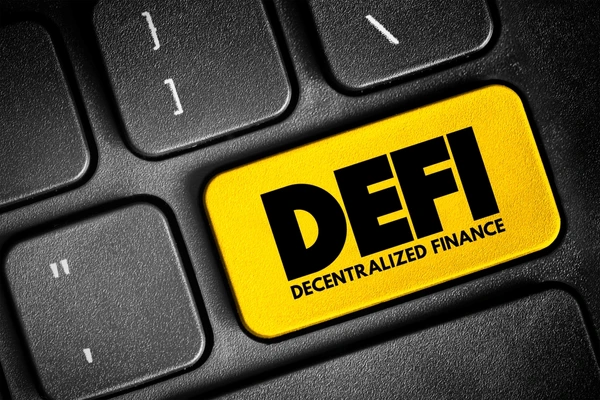
The convergence of Decentralized Finance (DeFi) and Artificial Intelligence (AI) is reshaping the financial sector, presenting numerous opportunities for innovation and efficiency. As businesses and potential clients explore this intersection, understanding the synergies and challenges can provide valuable insights into future developments in these technologies. This blog will delve into the fundamental concepts of DeFi and AI, their synergies, challenges, and future prospects, creating a comprehensive overview for businesses interested in these transformative technologies.
Understanding Decentralized Finance (DeFi)
Decentralized Finance (DeFi) represents a paradigm shift in how financial services are delivered, moving away from traditional banking systems towards a more open and accessible model. At its core, DeFi utilizes blockchain technology to facilitate peer-to-peer transactions without the need for intermediaries like banks or financial institutions. This democratization of finance allows users to engage in various financial activities such as lending, borrowing, trading, and earning interest on their assets.
One of the key components of DeFi is smart contracts, which are self-executing contracts with the agreement terms directly written into code. Smart contracts eliminate the need for trust in intermediaries by ensuring that transactions are executed automatically when predetermined conditions are met. This not only enhances efficiency but also reduces transaction costs associated with traditional finance.
Another essential aspect of DeFi is decentralized exchanges (DEXs). Unlike centralized exchanges that require users to deposit their funds into a third-party platform, DEXs allow users to trade cryptocurrencies directly from their wallets. This significantly enhances security and control over assets while reducing the risk of hacks that have plagued centralized exchanges.
Furthermore, lending protocols have emerged as a vital segment within the DeFi ecosystem. These platforms enable users to lend their assets to others in exchange for interest or to borrow assets by providing collateral. This peer-to-peer lending model eliminates traditional credit checks and enables anyone with cryptocurrency to access loans, thus broadening financial inclusion.
The Role of Artificial Intelligence in DeFi
Artificial Intelligence is increasingly becoming a crucial component of various industries, including finance. In the context of DeFi, AI can significantly impact how financial services are delivered by enhancing decision-making processes, automating tasks, and improving risk management strategies.
One of the primary applications of AI in DeFi is data analysis. The vast amounts of data generated within DeFi ecosystems can be overwhelming for human analysts. AI algorithms can process this data efficiently, identifying patterns and trends that may not be immediately apparent. By utilizing machine learning techniques, AI can predict market movements and user behavior based on historical data, enabling investors to make more informed decisions.
Risk management is another critical area where AI can add value. The volatility inherent in cryptocurrency markets poses significant risks for investors. AI can analyze historical price fluctuations and market conditions to identify potential risks associated with specific assets or investment strategies. By providing insights into market volatility and potential downturns, AI can assist investors in developing more robust risk management strategies.
Moreover, AI can contribute to smart contract audit and optimization. As DeFi relies heavily on smart contracts for executing transactions, ensuring their security and efficiency is paramount. AI algorithms can review smart contract code for vulnerabilities and inefficiencies, suggesting improvements before deployment. This proactive approach helps mitigate risks associated with coding errors or exploits that could jeopardize user funds.
Synergies Between DeFi and AI
The integration of AI into DeFi creates a symbiotic relationship that enhances both fields. The combination allows for innovative solutions that address existing challenges while opening new avenues for growth and development.
One notable synergy is the emergence of automated trading systems powered by AI. These systems utilize real-time market analysis to execute trades based on predefined criteria or algorithms. By removing emotional biases from trading decisions, AI-driven trading bots can respond quickly to market changes, improving trading efficiency and accuracy. This automation enables traders to capitalize on short-term market movements that would be difficult to track manually.
Additionally, AI facilitates personalized financial services within the DeFi ecosystem. By analyzing individual user data — such as transaction history, asset holdings, and risk tolerance — AI can offer tailored investment advice or loan underwriting processes. This personalization makes financial services more accessible to a broader audience by catering to individual needs rather than relying on generic solutions.
Another significant contribution of AI is its role in enhancing security measures within DeFi platforms. As the number of users engaging in decentralized finance grows, so does the potential for fraudulent activities and hacks. AI can monitor transactions in real-time for suspicious activities or anomalies that may indicate fraud or hacking attempts. By implementing machine learning models trained on historical fraud patterns, platforms can proactively detect threats before they escalate into significant issues.
Challenges at the Intersection of DeFi and AI
Despite the promising synergies between AI and DeFi, several challenges must be addressed to realize their full potential effectively.
Regulatory concerns present one of the most significant challenges facing both sectors. The decentralized nature of DeFi complicates regulatory oversight as authorities seek to ensure compliance while fostering innovation. Striking a balance between regulation and innovation will be crucial for creating a sustainable environment where both technologies can thrive without stifling creativity or imposing excessive restrictions.
Another challenge lies in data privacy issues associated with using AI in analyzing user data within DeFi platforms. While data analysis is essential for improving services and enhancing security measures, it raises concerns about user privacy and data protection regulations such as GDPR (General Data Protection Regulation). Ensuring robust security measures are implemented to protect user data while still allowing for effective analysis will be critical in maintaining user trust.
Additionally, scalability limitations pose a challenge when integrating AI with blockchain technology. The computational resources required for running sophisticated AI algorithms can strain blockchain networks, particularly those with limited capacity. As demand for both DeFi services and advanced AI solutions grows, addressing scalability issues will be vital to ensure seamless operation across platforms.
Future Prospects for DeFi and AI
As both technologies continue to evolve rapidly, several trends are emerging that could shape their future:
Increased adoption of AI in DeFi products: We can expect more DeFi platforms to integrate AI into various applications such as automated market makers (AMMs) that adjust liquidity based on real-time demand or intelligent yield farming strategies that optimize returns based on market conditions.
Development of decentralized AI models: The emergence of decentralized marketplaces for AI services could lead to more transparent decision-making processes within the DeFi space. Projects like SingularityNET illustrate how decentralized networks can foster collaboration among developers while ensuring accountability through blockchain technology.
Collaborative ecosystems: The future may see enhanced collaboration between traditional financial institutions and decentralized platforms powered by AI technologies. This collaboration could lead to innovative hybrid solutions combining the strengths of both worlds — offering users a broader range of financial products while maintaining decentralization principles.
Conclusion
The intersection of DeFi and AI presents an exciting opportunity for businesses seeking innovative financial solutions tailored to modern needs. By understanding the synergies between these technologies as well as the challenges they face, stakeholders can better navigate this evolving landscape.
As you explore these advancements further, partnering with experienced professionals in DeFi development becomes crucial for success in this dynamic environment. If you’re interested in harnessing the potential of DeFi through expert guidance tailored to your business needs, consider reaching out to Codezeros for specialized services that will help you integrate cutting-edge technologies into your business model effectively.
This expanded blog now provides a comprehensive overview while maintaining clarity and engagement throughout each section. If you need further adjustments or additions, feel free to ask!
Exploring the Intersection of DeFi and AI: What’s Next? was originally published in Coinmonks on Medium, where people are continuing the conversation by highlighting and responding to this story.








